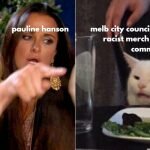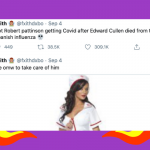Content warning: this article discusses suicide and sexual assault.
Today is R U OK? Day, a national suicide prevention campaign that gets you to start conversations around mental health to break down stigma and potentially save a mate’s life. It’s all about discussing the impacts of social isolation, reminding everyone to reach out and check in on friends and family because you never know what someone is going through.
While this might have started as a wholesome effort to bridge the gap in communication between people suffering from mental health issues and their support system, it’s been co-opted pretty quickly by corporations using the aesthetic to make their brands look friendly and approachable (ugh, capitalism).
Pretty sceptical about “RU Okay Day”, seems like just another day in the corporate morning tea calendar & most people joke-asking their friends if they’re okay aren’t equipped to help if the answer is “no”
— Joshua Badge (@joshuabadge) September 10, 2020
Most of the criticism around R U OK? Day comes from the fact that we should be asking people about their health every day, but I think it’s much deeper than that. While R U OK? Day doesn’t really do anything aside from surface level commentary on needing to talk about our feelings, what about what drives people to their breaking point in the first place?
For me, R U OK? Day is a tokenistic farce because it’s just a distraction from the underlying societal issues that create mental health problems in the first place. It helps us shift blame from the lack of funding in support services and our critical unemployment problem, to individual members of society not checking in on their mates.
It only takes a few googles to find the most common causes of suicide, and in Australia these are poverty and unemployment – showing that this is first and foremost, a class issue.
This R U Ok Day, let’s remember that the best way to make people feel okay is knowing they have enough money to buy food and pay their bills. https://t.co/nITwzMr0KJ
— Rachel Fenner (@thisisrachels) September 10, 2020
“The most elevated categorical risk groups to suicide are children and individuals who as children were removed from their biological families,” Gerry Georgatos says in an article on suicide prevention in Australia.
“Thereafter, it’s recently-released prisoners. Thereafter, it’s individuals sexually abused as children. Thereafter, it’s recently evicted families who shift itinerant from house-to-house or homeless, from squats to parks.
“However, the underwriting narrative is poverty. Within this intertwining narrative are an arc of negative issues that are always more pronounced below the poverty line, and particularly among crushing poverty, such as domestic violence and bullying.”
Happy Annual ✨ Think of a Surface Level Issue To Share With Your Manager Instead of Your Real Struggles When They Ask R U OK Day 😌✨
— Atticus Binch (@frist_of_all) September 10, 2020
Suicide prevention isn’t just asking if someone is okay. Suicide prevention is dismantling the structures in society that result in them feeling trapped and depressed in the first place.
Suicide is, fundamentally, a poverty issue. There is a direct correlation between high suicide rates and periods of unemployment, and during COVID-19 unemployment is obviously much worse. First Nations people have one of the highest suicide rates in the world, and almost 100% of the time, the individual was living below the poverty line.
The best thing universities could do on RUOK day is reverse their job cuts decisions, reinstate everyone who has lost their job since March, and give an additional year of funding to current PhDs. Aka help the material conditions of staff livelihood, not just promote mindfulness
— Hannah McCann (@binarythis) September 9, 2020
Affordable housing is suicide prevention.
When homelessness and poverty are all factors inextricably linked to suicide, we need to work on eradicating these stressors to make any impact on the rates of suicide in this country. Despite (or rather, because of) the fact that Australia doesn’t recognise housing as human right, homelessness is skyrocketing and we are in a housing crisis. How can we be serious about suicide prevention if we don’t take this into account?
Universities: Hey everyone 🥰today is R U OK day😌, please come pick up a care package of some tea ☕️and biscuits 🍪and check in with your team👩🔬2020 has been tough, but we’re in it together and can do it 💪
Also Universities: We’re firing half of you.
— Adam Hines 🔬🧠🎸 (@AdamDHines) September 10, 2020
Financial stability and employment is suicide prevention.
Do corporations that encourage R U OK brunches also consider if their employees have a stable income that covers all their basic needs and gives them the financial status to afford self care in the first place? Work stress is real, especially when employment is precious and scarce – this just allows corporations to exploit people further, because we’re too desperate for a job to do anything about it.
At a time where workforces are becoming casualised, unemployment is increasing, and our government has other priorities, suicide prevention campaigns are meaningless.
In honour of R U OK day pic.twitter.com/T8DSpjrR2i
— val 🦋 should be studying (@dyadstyles) September 10, 2020
Free, accessible mental health support is suicide prevention.
Seeing a psychologist is not an easy process – for one thing, wait lists are months long. And sessions are not free, either. Some of us can claim ten sessions free on Medicare, but this doesn’t mean much when it can take that long just to find a psychologist that works for you.
Australian unis every other day: nah, we still won’t address sexual assault & harassment or increase the number of counsellors we have so that you don’t have to wait three months for an appointment.
Australian unis today, multiple times, on every social media platform: R U OK— Sharna Bremner (@sharnatweets) September 9, 2020
Domestic violence and sexual assault victim support is suicide prevention.
As mentioned earlier, sexual assault and domestic violence are also risk factors to suicide. The funding for domestic violence support in this country is abysmal, and things get worse when you consider the recent laws that mean rape victims would need their rapists’ permission before talking about what happened to them.
Climate action is suicide prevention.
Eco-anxiety is a fancy new phrase recently coined to refer to the crippling feeling of doom and helplessness young people feel in relation to climate change. It’s hard to stay positive and take care of yourself during a time where we are seeing the world burn (quite literally, here in Australia) and feeling like you can’t control or reverse it.
If we shut down the fossil fuel industry and took precautions to save our planet, we would save lives in more ways than one.
First Nations sovereignty is suicide prevention.
First Nations people have one of the highest suicide rates in the world. Partially this is due to the previous points about poverty and support – but we need to discuss why these overlap.
The fact that Australian society was built on the genocide, trauma and suffering of First Nations people is often dismissed as history, but this is an ongoing issue. The stolen generations haven’t stopped, police brutality against First Nations people hasn’t stopped. This country is still a hostile space for the people it was stolen from, and until that changes, how can we hope to prevent suicides?
what if the money raised for r u ok day was given to help the suicidal man pay off his fine?
— basmala (@basmalaasaada) September 6, 2020
R U OK Day is a tokenistic farce that distracts the public from more substantial (and therefore, difficult and costly) efforts of suicide prevention. Instead of putting in the work to create a society that actually supports the needs of everyone, we just smile and say “are you okay?” and move on with our day.
This isn’t enough.
I’m sure R U OK is well-intentioned but holding it on the same date as World Suicide Prevention Day is problematic. Instead of forensically examining the systemic drivers of Australia’s high suicide rates, we’ve got corporates using the day to promote their brands. Not helpful.
— Jill Stark (@jillastark) September 9, 2020
Instead of asking people if they are okay, we should be dismantling the parts of our society that result in their struggles in the first place – and part of doing that involves holding our government and large corporations accountable for their actions and how this impacts the most vulnerable of our population.
Image Sources: Twitter




